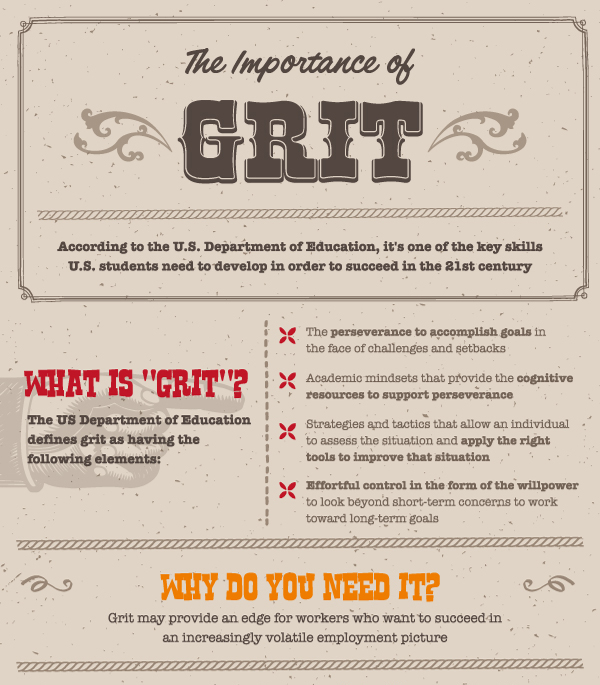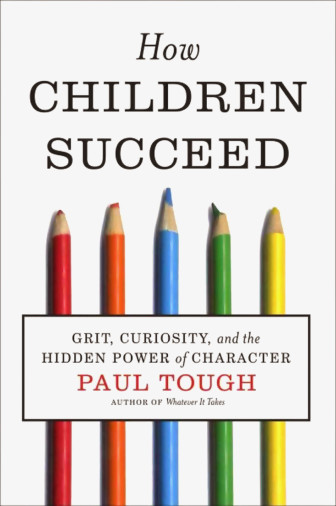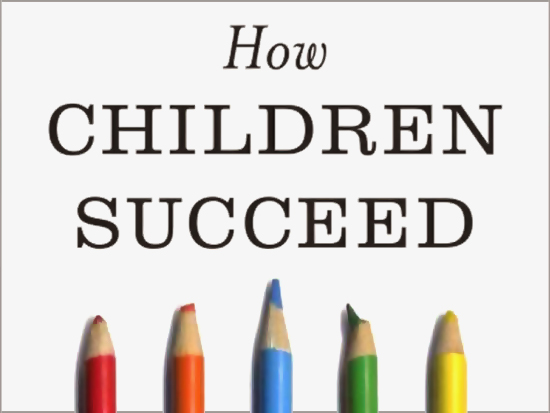
elearninginfographics.com
Research by Angela Duckworth at the University of Pennsylvania fueled a movement to teach kids \”grit.\” Studies showed the characteristic was a predictor of academic success in students. However, a University of Texas at Dallas researcher finds no correlation between grit and creativity. (Photo links to the full infographic.)
A little debate about “grit” has surfaced. The word popped into the public discourse about youth and education a few years ago, popularized in particular by Angela Duckworth, an associate professor of psychology at the University of Pennsylvania. In her research, Duckworth, who was awarded a MacArthur “genius grant,” found that the main characteristic that predicted academic success among the students she surveyed was grit, which she defines as passion and perseverance for very long-term goals.  Paul Tough’s bestselling 2012 book, How Children Succeed: Grit, Curiosity and the Hidden Power of Character, added to the interest in helping kids become “grittier.” But another researcher is now saying that while grit may be linked to academic success, it doesn’t seem linked to creativity. Psychologist Magdalena Grohman at the University of Texas at Dallas surveyed data from college students and found no correlation between creativity and grit. Grohman is associate director of the Center for Values in Medicine, Science and Technology. Her research found no link between creative achievement and the qualities of consistency and perseverance. Instead, it found that the predictor of creative achievement is an openness to new experiences. Grohman cautions that her research is preliminary. It was presented at the American Psychological Association conference this year but has not yet been published. Grohman undertook the research because she wanted to see if the relationship Duckworth observed between grit and achievement would be seen in areas such as visual arts, music, creative writing, culinary arts, science and inventions, she said. Duckworth “hasn’t looked at creative achievement,” she said. Grohman is collaborating with Scott Barry Kaufman at the University of Pennsylvania. Similar work is being done by Zorana Ivcevic-Pringle at Yale and Paul Silvia at the University of North Carolina, Greensboro. Grohman noted that grit comes into play as a predictor of success when a goal is very specific. “Once you define your goal, it’s easier to be gritty,” she said. Artistic work, however, is more open-ended. The ideas developed by Duckworth, who declined to be interviewed for this article, have been eagerly picked up by some who work with kids. The Knowledge is Power Program (KIPP) charter school network focuses on character education and seeks to teach the qualities of grit, curiosity, zest, social intelligence, optimism, self-control and gratitude. It uses a “character growth card” to determine how well students demonstrate those qualities. Grohman sees this as going too far. “Such actions are very premature,” she said. “We still don’t know what grit truly is” and the research is continuing. Leyla Bravo-Willey, director of KIPP Infinity lower and middle school, disagrees. KIPP’s character growth card is not a report card or an assessment, she said. “It’s designed as a tool to help facilitate dialogue between parents, students and teachers about how a student is developing his or her character strengths,” she said.
Paul Tough’s bestselling 2012 book, How Children Succeed: Grit, Curiosity and the Hidden Power of Character, added to the interest in helping kids become “grittier.” But another researcher is now saying that while grit may be linked to academic success, it doesn’t seem linked to creativity. Psychologist Magdalena Grohman at the University of Texas at Dallas surveyed data from college students and found no correlation between creativity and grit. Grohman is associate director of the Center for Values in Medicine, Science and Technology. Her research found no link between creative achievement and the qualities of consistency and perseverance. Instead, it found that the predictor of creative achievement is an openness to new experiences. Grohman cautions that her research is preliminary. It was presented at the American Psychological Association conference this year but has not yet been published. Grohman undertook the research because she wanted to see if the relationship Duckworth observed between grit and achievement would be seen in areas such as visual arts, music, creative writing, culinary arts, science and inventions, she said. Duckworth “hasn’t looked at creative achievement,” she said. Grohman is collaborating with Scott Barry Kaufman at the University of Pennsylvania. Similar work is being done by Zorana Ivcevic-Pringle at Yale and Paul Silvia at the University of North Carolina, Greensboro. Grohman noted that grit comes into play as a predictor of success when a goal is very specific. “Once you define your goal, it’s easier to be gritty,” she said. Artistic work, however, is more open-ended. The ideas developed by Duckworth, who declined to be interviewed for this article, have been eagerly picked up by some who work with kids. The Knowledge is Power Program (KIPP) charter school network focuses on character education and seeks to teach the qualities of grit, curiosity, zest, social intelligence, optimism, self-control and gratitude. It uses a “character growth card” to determine how well students demonstrate those qualities. Grohman sees this as going too far. “Such actions are very premature,” she said. “We still don’t know what grit truly is” and the research is continuing. Leyla Bravo-Willey, director of KIPP Infinity lower and middle school, disagrees. KIPP’s character growth card is not a report card or an assessment, she said. “It’s designed as a tool to help facilitate dialogue between parents, students and teachers about how a student is developing his or her character strengths,” she said.


























